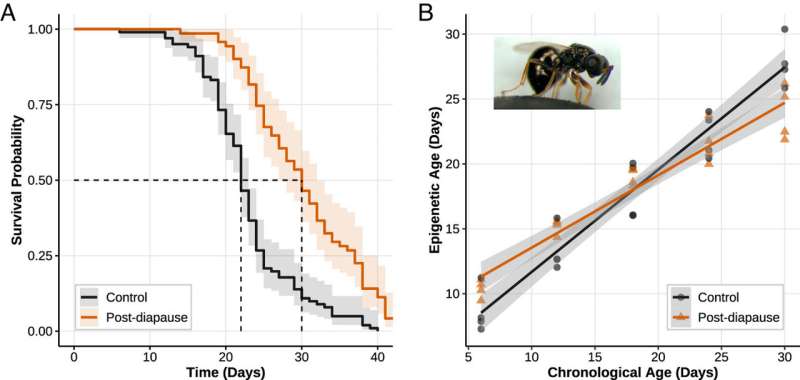
Research conducted by scientists at the University of Leicester has uncovered remarkable insights into the aging process through the study of jewel wasps, specifically Nasonia vitripennis. Published on July 29, 2025 in the journal Proceedings of the National Academy of Sciences, the study reveals that these insects can effectively slow their biological aging by entering a natural state of dormancy during early development.
Jewel Wasps and Their Unique Aging Process
The jewel wasp, known for its striking metallic colors, exhibits a fascinating ability to pause its developmental clock while in the larval stage. This phenomenon, referred to as diapause, allows the wasps to emerge into adulthood with an extended lifespan. The research team, led by Ph.D. student Erin Foley, along with Dr. Christian Thomas, Professor Charalambos Kyriacou, and Professor Eamonn Mallon, explored how environmental factors influence aging.
By exposing jewel wasp mothers to cold and darkness, the researchers triggered this hibernation-like state in their offspring. The result was striking: the adult wasps that had experienced diapause lived more than one-third longer than those that did not undergo this developmental pause. Furthermore, they aged 29% more slowly at the molecular level, as indicated by the pace of their epigenetic clocks, a measure of biological aging linked to DNA methylation.
Implications for Understanding Aging
According to Professor Mallon, “It’s like the wasps who took a break early in life came back with extra time in the bank.” This groundbreaking study is significant because it demonstrates that aging can be influenced by environmental conditions even before adulthood begins. While other species have shown the ability to slow aging during dormant states, this research is unique in highlighting that the benefits can persist after development resumes.
The findings indicate that the molecular slowdown is not merely coincidental; it is associated with changes in critical biological pathways that are conserved across various species. These pathways, particularly those involved in insulin and nutrient sensing, are also being targeted for potential anti-aging interventions in humans.
This work represents a novel approach to understanding aging, showcasing how early life events can have lasting repercussions on health and the biological aging process. “Understanding how and why aging happens is a major scientific challenge,” Professor Mallon stated. “This study opens up new avenues for research, not just into the biology of wasps, but into the broader question of whether we might one day design interventions to slow aging at its molecular roots.”
With its genetic tools, measurable aging markers, and clear connections between development and lifespan, the jewel wasp is emerging as a promising model in aging research. As Mallon aptly noted, “In short, this tiny wasp may hold big answers to how we can press pause on aging.”
This research offers a compelling glimpse into the future of aging studies, potentially paving the way for innovative strategies to enhance human longevity. The full study can be accessed in the Proceedings of the National Academy of Sciences.







